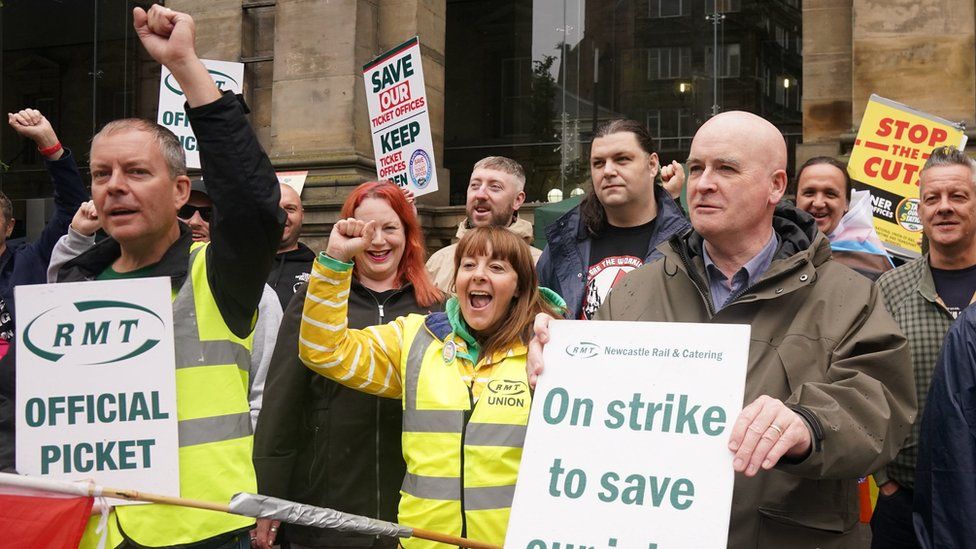ARTICLE AD BOX
 Image source, PA Media
Image source, PA Media
Rail workers have walked out regularly over the past 18 months
By Becky Morton
Political reporter
About 40% of rail services will run during strikes under planned minimum service rules for train operators in Great Britain, the government has said.
Ministers are hoping the legislation will come into effect before Christmas.
It will also specify minimum service levels for ambulance workers in England and border security staff in England, Wales and Scotland.
The government said the measures were "proportionate" but unions have criticised them as unworkable.
The country has been facing a wave of strike action across the public sector, after wages failed to keep up with soaring prices.
Many of these disputes have now been resolved, but others are continuing.
There are no further rail strikes scheduled currently, but there is an ongoing dispute between rail companies, train drivers' union Aslef and the RMT union, which represents other rail workers.
Union members have regularly walked out during the past 18 months over pay and conditions, including last Christmas, and there is the potential for more strike action in the coming months.
Under a law passed by Parliament earlier this year, ministers can set minimum service levels for health, fire and education services, as well as border security and nuclear decommissioning.
Some employees would be required to work during industrial action and could be sacked if they refuse, while unions which fail to comply could face damages claims from employers of up to a million pounds.
The government has completed consultations on the service levels required for ambulance and rail workers, with other sectors to follow.
Under the rules for train operators, the government said the equivalent of 40% of normal timetables should operate during strike action, allowing priority routes to stay open.
For ambulance workers in England, the legislation has been designed to ensure emergency services will continue throughout any strike action and all life-threatening calls will be responded to.
The legislation will also apply to Border Force employees and some Passport Office staff in England, Wales and Scotland.
The government said it would ensure all ports and airports remain open on strike days and that the level of service provided by border security will be as effective as if no industrial action was taking place.
The legislation will be laid in Parliament on Tuesday, with ministers hoping it will come into effect by Christmas, subject to parliamentary approval.
The government said the measures would ensure public services could continue during walkouts, while balancing the ability to take industrial action.
Prime Minister Rishi Sunak said: "We are doing everything in our power to stop unions derailing Christmas for millions of people.
"This legislation will ensure more people will be able to travel to see their friends and family, and get the emergency care they need."
'Undemocratic'
Under the legislation, employers can issue work notices to unions, identifying who is required to work during industrial action.
There would be no automatic protection from unfair dismissal for an employee who is told to work through a notice but chooses to strike.
The TSSA transport union said the legislation would not work and would only "inflame industrial tensions".
"Moreover, it's undemocratic and a direct attack on the right to strike which is at the heart of British democracy," the union's head Maryam Eslamdoust said.
Mick Lynch, general secretary of the RMT union, said: "We believe employers have the discretion not to issue minimum service work notices and, as such, we are calling on them not to issue them.
"Any employer that seeks to issue a work notice will find themselves in a further dispute with my union."
GMB, Unison and Unite also criticised the measures, arguing they would not solve the problems in the NHS.
Labour, which has said it would repeal the legislation, said the government was "getting their excuses in early for Christmas".
The party's deputy leader Angela Rayner said: "Rishi Sunak is offering another sticking plaster to distract from the Conservatives' track record of failure.
"We all want minimum standards of service and staffing, but it's Tory ministers who are consistently failing to provide them."
The Department of Health and Social Care is currently consulting on extending minimum service levels to cover other emergency services, which could include nurses and doctors.
Health unions already provide "life and limb" cover during strikes, because under existing laws it is illegal to take industrial action that would endanger human life.
Education Secretary Gillian Keegan has committed to introducing minimum service levels in schools on a voluntary basis, if an agreement can be reached with unions. The department also plans to consult on introducing minimum service levels in universities.

 1 year ago
24
1 year ago
24








 English (US) ·
English (US) ·